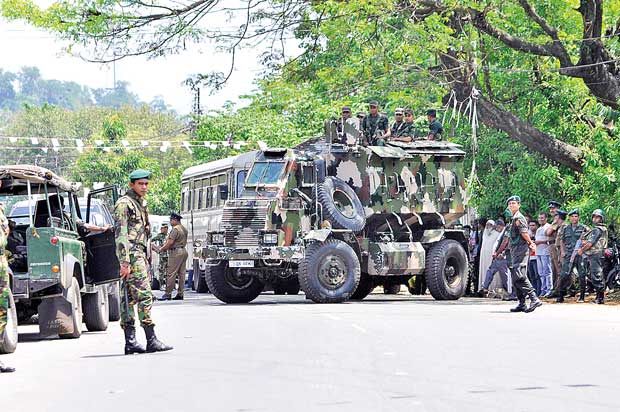Reply To:
Name - Reply Comment
Last Updated : 2024-04-27 08:30:00

The two days that followed the government’s announcement that things had returned to normal in Kandy were tempestuous; rains, full of sound and thunder, almost like a catharsis to the horror that had preceded them.
 “May the rains wash away the racism,” was how one commentator put it on Twitter. It would be unbecoming of me not to suggest that this is what we, the majority, want. The lives lost of the two peoples -- one the Sinhalese and the other Muslims, can never be brought back, but mercifully those deaths did not trigger a pogrom.
“May the rains wash away the racism,” was how one commentator put it on Twitter. It would be unbecoming of me not to suggest that this is what we, the majority, want. The lives lost of the two peoples -- one the Sinhalese and the other Muslims, can never be brought back, but mercifully those deaths did not trigger a pogrom.
Instead we saw members of the clergy, from both sides of the divide, work with each other even in areas where pogroms could easily have occurred. Hence last Friday, the day of prayer and reflection for Muslims, passed on peacefully. If only the reactions of the elite and the born-again liberals were as worthy of praise as that.
In “Big Match 1983”, Yasmin Gooneratne ends with these prophetic lines:
Near the wheels of his smashed bicycle,
at the corner of Duplication Road a child lies dead,
and two policemen look the other way,
as a stout man, sweating with fear, falls to his knees,
beneath a Bo-tree in a shower of sticks and stones,
flung by his neighbour’s hands
The joys of childhood, friendships of our youth,
ravaged by pieties and politics,
screaming across our screens her agony,
at last exposed, Sri Lanka burns alive.
We need to think beyond this simplistic model which assumes that the panacea to all evil in the world is membership of a particular clique, belonging more often than not to a privileged circle
What is worse than the excesses of the chauvinist, like the administrators of the Mahason Balakaya, is the indifference of those who speak loftily about those sunshine days which they spent with friends from other ethnicities. The joys of childhood, juxtaposed with the showers of sticks and stones we hurl, for me brings up a point of contrast between the milieu to which those two groups belong to the stunted peasantry on the one hand and the obese privileged on the other. I am aware that I am generalising a little here, but my act of generalising is based on a desire to point out that while the fires burn, while racism swings both ways and takes this country closer to its imminent death, the privileged, regardless of ethnic and religious affiliations, continue to remember their sunshine days and reflect on a reality that was true only for their milieu. 
If we are to progress, if we are to get rid of racism, if not completely then at least effectively, we need to think beyond the friends we made when we were at school, the harmonious relationships we kept alive in our childhood and the various shops and eateries we frequented which were owned by those who belonged to other races and religions. We need to think beyond the institutions of privilege – at school or elsewhere – which guaranteed an absence of racial disparities and chauvinism. No consensus has ever been reached with respect to the assumption, sustained by quite a number of people here, that membership of esoteric institutions in the longer term does away with racism. Chauvinists and racists tend to house those privileged quarters too, and far from embracing other collectives through the culture of coexistence rooted in these institutions, they tend to turn into renegades and vent out their chauvinist streak in terrible ways.
We need to think beyond this simplistic model which assumes that the panacea to all evil in the world is membership of a particular clique, belonging more often than not to a privileged circle that defines itself by differentiating itself from the rest of the country. The ordinary Sinhalese, Tamil, Muslim, and Burgher man or woman on the street, who is not a member of and has never been near such institutions of privilege, cannot and will not take notice of those who hail from them when they set about giving vent to their racist rants and raves. Those who suffered from both ends in Kandy, in that sense, neither affirm nor care about the assumptions we make with respect to the link between those institutions and the (supposed) absence of chauvinism which distinguishes them. Racism is real and alive most potently in less privileged, if not unprivileged, cultural spaces, which those who speak in high-heeled (!) terms about the friendships they inculcated at their schools probably aren’t aware of. Again, I am generalising here for a reason.
Instead we saw members of the clergy, from both sides of the divide, work with each other even in areas where pogroms could easily have occurred and last Friday’s prayers passed on peacefully
Simply put, we cannot get out of this conundrum, this clash of civilisations within a larger, homogenous civilisation, if we inculcate in our schoolchildren an attitude of indifference towards such a clash with the excuse, “Hey, we learned not to fight with each other over our ethnic and religious backgrounds when we were at school, so why don’t you all just shut up, shove it in, and let us guide you?”
Such an attitude reeks of ignorance at best and elitism at worst, and it explains why, as a friend of mine put it through a Facebook post the other day, our post-1948 political experience has been marred so much; because in that post-independence era, the country ended up swerving between two pillars of power (the UNP and the SLFP) which were housed by the same privileged, elitist meritocrats who believed (what else?) that membership of privileged quarters was the magic potion that could do away with all evil. It’s that attitude which, while clearly dying (and thankfully), has delegitimized any genuine attempt at brokering peace in the eyes of the ordinary Sinhalese, Tamil and Muslim.
My friend (and a great friend at that, by the way) Hafeel Farisz, interviewing C.V. Wigneswaran more than a year ago, posed a rather interesting question: “Isn’t it a fact that from the time of Navalar or Dharmapala or Bandaranaike to Chelvanayagam, and now to you, it was [always] the elite who fought their political battles at the expense and the blood of the common man?”
I like Hafeel’s brash honesty and I have come to appreciate the points he raises and the questions he asks, even if they are derided and vilified by half the country. In this case especially, I appreciate and agree with his question, because it’s a question that provides its own answer. Because yes, it was the elite, and yes, the same elite that Yasmin wrote about in her poem, as the schoolboys danced away, watched the match in progress, yelled to their heart’s content, and celebrated the diversity they had institutionalised in their closed, privileged quarters, while the rest of the country, comprising not of them and me, but of the ordinary Sinhalese, Tamil and Muslim farmers and civil servant, burnt.
Racism is real and alive most potently in less privileged, if not unprivileged, cultural spaces
So what have we learned? That the friend I alluded to, with his Facebook post, provided the best answer; that on a superficial level, we have something to blame for everything that is wrong with this country; the exemplary leadership that these elites, hailing from their closeted quarters, unleashed on
this country.
From Bandaranaike onwards, that leadership didn’t lead us to the Promised Land. It led us instead to Vaddukoddai, 1983, Aluthgama, and now Digana.

Add comment
Comments will be edited (grammar, spelling and slang) and authorized at the discretion of Daily Mirror online. The website also has the right not to publish selected comments.
Reply To:
Name - Reply Comment
US authorities are currently reviewing the manifest of every cargo aboard MV
On March 26, a couple arriving from Thailand was arrested with 88 live animal
According to villagers from Naula-Moragolla out of 105 families 80 can afford
Is the situation in Sri Lanka so grim that locals harbour hope that they coul